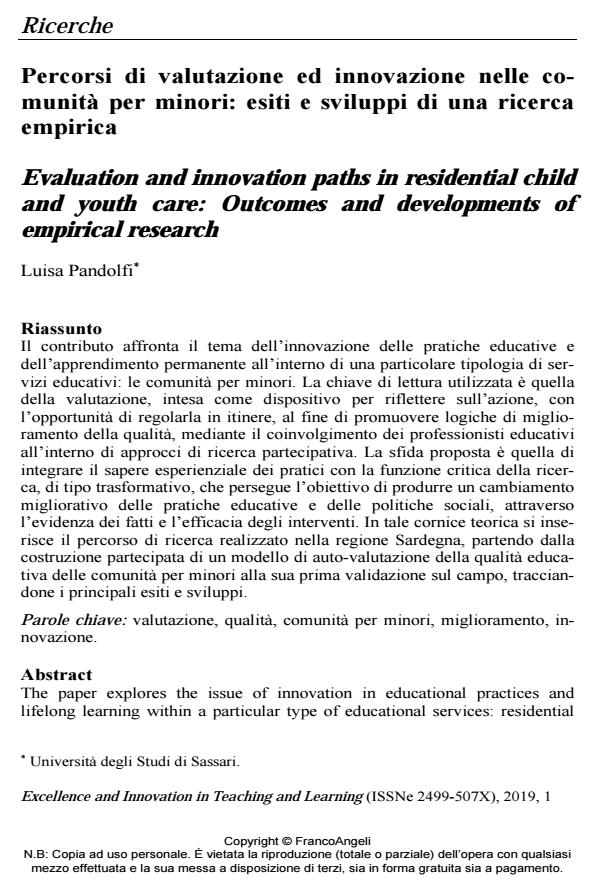Evaluation and innovation paths in residential child and youth care: Outcomes and developments of empirical research
Journal title EXCELLENCE AND INNOVATION IN LEARNING AND TEACHING
Author/s Luisa Pandolfi
Publishing Year 2019 Issue 2019/1
Language Italian Pages 16 P. 61-76 File size 266 KB
DOI 10.3280/EXI2019-001004
DOI is like a bar code for intellectual property: to have more infomation
click here
Below, you can see the article first page
If you want to buy this article in PDF format, you can do it, following the instructions to buy download credits

FrancoAngeli is member of Publishers International Linking Association, Inc (PILA), a not-for-profit association which run the CrossRef service enabling links to and from online scholarly content.
The paper explores the issue of innovation in educational practices and lifelong learning within a particular type of educational services: residential child and youth care. The reading key used is the evaluation, intended as a device for reflecting on action, with the opportunity to regulate it in progress, in order to promote quality improvement logics, through the involvement of educational practitioners within participatory research approaches. The proposed challenge is to integrate the experiential knowledge of the practitioners with the critical function of transformative research, that aims the objective of producing an improvement in educational practices and social policies, through the evidence based and the effectiveness of the interventions. In this theoretical framework, the research path carried out in the Sardinia region is described, starting from the participatory construction of a model of self-evaluation of the educational quality of the resdiential care to its first validation in the field, marking out the main results and developments.
Keywords: Evaluation, quality, residential care, improvement, innovation.
- Boel-Studt, S., Huefner, J.C., Bender, K., Huang, H., & Abell, N. (2018). Developing Quality Standards and Performance Measures for Residential Group Care: Translating Theory to Practice. Residential Treatment for Children & Youth, 35, 1-22. DOI: 10.1080/0886571X.2018.1536494
- Boel-Studt, S., & Tobia, L. (2016). A Review of Trends, Research, and Recommendations for Strengthening the Evidence-Base and Quality of Residential Group Care. Residential Treatment for Children & Youth, 1, 13-35. DOI: 10.1080/0886571X.2016.1175995
- Canali, C., Vecchiato, T., & Whittaker, J.K. (a cura di) (2008). Conoscere i bisogni e valutare l’efficacia degli interventi per bambini, ragazzi e famiglie in difficoltà. Padova: Fondazione Emanuela Zancan.
- Castoldi, M. (2013). Valutare. In Bertagna G., & Triani P. (a cura di), Dizionario di didattica. Concetti e dimensioni operative (pp. 417-430). Brescia: La Scuola.
- Grietens, H. (2008). Quali prospettive europee a proposito di interventi ‘evidence based’ per bambini e ragazzi a rischio e le loro famiglie. In Canali C., Vecchiato T., & Whittaker J.W. (a cura di), Conoscere i bisogni e valutare l’efficacia degli interventi per bambini, ragazzi e famiglie in difficoltà (pp. 38-41). Padova: Fondazione Emanuela Zancan.
- Guba, E.G., & Lincoln, Y.S. (1981). Effective evaluation: Improving the usefulness of evaluation results through responsive and naturalistic approaches. San Francisco: Jossey-Bass.
- Istituto degli Innocenti (2017). Linee di indirizzo per l’accoglienza nei servizi residenziali per minorenni.
- Legge 28 marzo 2001, n.149. Diritto del minore alla propria famiglia.
- James, S. (2015). Attitudes, Perceptions, and Utilization of Evidence-Based Practices in Residential Care. Residential Treatment for Children & Youth, 2, 144-166. DOI: 10.1080/0886571X.2015.1046275
- Pandolfi, L. (2017). La costruzione partecipata di linee guida e di uno strumento per l’auto-valutazione delle comunità per minori. In Notti A.M. (a cura di), La funzione educativa della valutazione. Teorie e pratiche della valutazione educativa (pp. 627-647). Lecce: PensaMultimedia.
- Sità, C., & Mortari, L. (2015). Il compito impossibile? La valutazione nei Centri per bambini e famiglie come strumento di crescita professionale. Rivista Italiana di Educazione Familiare, 2, 161-178. DOI: 10.13128/RIEF-17793
- Stake, R.E. (1983). Program Evaluation. Particularly Responsive Evaluation. In Madaus G.F., Scriven M.S., & Stufflebeam, D.L. (Eds.), Evaluation Models. Viewpoints on Educational and Human Services Evaluation (pp. 287-310). Netherlands: Springer.
- Stame, N. (2007). I classici della valutazione. Milano: FrancoAngeli.
- Stufflebeam, D.L. (2002). The CIPP Model. Evaluation in Education and Human Services, 49, 279-317.
- Tyler, R. (1949). Basic Principles of Curriculum and Instruction. Chicago: The University of Chicago Press.
- Trinchero, R., & Robasto, D. (2019). I mixed methods nella ricerca educativa. Milano: Mondadori.
- Viganò R. (2010), Challenge strategici ed epistemologici per la ricerca in educazione. Education and Sciences & Society, 1, 91-100.
Luisa Pandolfi, Percorsi di valutazione ed innovazione nelle comunità per minori: esiti e sviluppi di una ricerca empirica in "EXCELLENCE AND INNOVATION IN LEARNING AND TEACHING" 1/2019, pp 61-76, DOI: 10.3280/EXI2019-001004